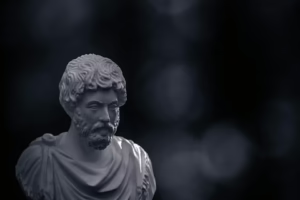Beyond the Basics: Exploring Philosophy’s Deepest Questions of Meaning
Introduction
Philosophy is often seen as an abstract discipline, reserved for scholars and intellectuals who engage in lofty debates about the fundamental nature of existence. However, the questions philosophical inquiry addresses are deeply rooted in the human experience. As we navigate our lives, we often encounter profound questions about meaning, purpose, and our place in the universe. This article explores these deeper questions, examining major philosophical theories, and their implications for understanding meaning in our lives.
What is Meaning?
Defining Meaning
To embark on this exploration, we must first define meaning. In philosophical contexts, meaning arises as a variable concept depending on whether we are considering linguistic meaning, existential meaning, or moral meaning. Linguistic meaning pertains to language—a set of symbols that communicate ideas. Existential meaning focuses on the purpose of life itself, while moral meaning deals with ethics and values governing human behavior.
The Importance of Meaning
Philosophers such as Viktor Frankl argue that meaning is an essential component of human existence. In his book Man’s Search for Meaning, he posits that the quest for meaning transcends suffering and can even empower individuals to overcome extreme adversity. Thus, understanding the nature of meaning can guide not only philosophical discussions but also psychological resilience.
Historical Perspectives on Meaning
Philosophy’s historical journey is replete with different interpretations of meaning, each shaped by the cultural and intellectual context of the time.
Ancient Philosophy
-
Plato and the Theory of Forms: In Plato’s worldview, meaning is grounded in the existence of immutable forms or ideas. For instance, the concept of "Beauty" exists in a perfect form, while earthly manifestations are mere shadows. This idealism suggests that understanding the eternal forms leads to a deeper grasp of meaning.
- Aristotle’s Teleology: In contrast, Aristotle introduces the idea of teleology—meaning exists in the purpose or end goal of an object or being. For example, an acorn has the potential to become an oak tree. Meaning lies not just in existence but in the realization of purpose.
Medieval Philosophy
-
St. Augustine and Divine Order: Augustine merged Christian theology with philosophical inquiry, arguing that true meaning is found in a relationship with God. For him, human beings are inherently restless until they find rest in the divine.
- Thomas Aquinas’ Natural Law: Aquinas expanded Aristotle’s teleological views, positing that natural law reveals a divine purpose woven into the fabric of human nature. Understanding and aligning oneself with this law is a path to achieving moral and existential meaning.
Modern Philosophy
-
Existentialism: Moving into the modern era, existentialist thinkers like Jean-Paul Sartre and Albert Camus reject objective meaning, asserting that individuals must create their own meaning in an absurd world. This perspective places the responsibility for meaning squarely on personal choice and subjective experience.
- Postmodernism: As 20th-century thought evolved, postmodernists like Michel Foucault challenged the notion of absolute truths and meanings. They argue that meaning is socially constructed, leading to an understanding that meaning is both fluid and context-dependent.
The Nature of Meaning: Key Philosophical Theories
The Existential Question: Why Are We Here?
At the heart of philosophical inquiry is the existential question of purpose. Existentialists posit that existence precedes essence, meaning individuals must navigate their own paths to construct meaning in a world devoid of inherent purpose.
Kierkegaard and the Leap of Faith
Søren Kierkegaard emphasized subjective experience, suggesting that true meaning stems from personal engagement with faith and existence. He introduced the idea of the "leap of faith," which suggests that confronting life’s uncertainties requires a personal commitment to meaning.
Sartre’s Freedom and Responsibility
Jean-Paul Sartre famously proclaimed, "existence precedes essence," asserting that individuals are condemned to be free. This freedom entails responsibility for creating meaning in one’s life. For Sartre, authentically engaging with one’s freedom is imperative to live an authentic life, though it can often lead to feelings of angst.
The Search for Objective Meaning
Contrasts exist within philosophical thought, particularly regarding whether objective meaning exists independent of human perception.
Utilitarianism and Meaning in Consequences
Utilitarian philosophers, such as Jeremy Bentham and John Stuart Mill, propose an objective method for assessing meaning through the consequences of actions. The "greatest happiness principle" provides a framework where the moral worth of actions is determined by their ability to produce pleasure or minimize pain.
Deontology and Meaning in Duty
Immanuel Kant offers a contrasting view through deontological ethics, emphasizing duty and moral law. Kant’s categorical imperative posits that actions should be universally applicable, suggesting intrinsic meaning in following moral principles irrespective of the outcomes they generate.
Contemporary Understandings of Meaning
In the current landscape, the search for meaning continues to evolve amid growing scientific understanding and existential risk.
The Intersection of Science and Meaning
Cosmology and Human Significance
The field of cosmology challenges human-centered understandings of meaning by revealing our tiny place in an immense universe. Stephen Hawking’s work on black holes and the nature of time has led to philosophical reflections on human significance, often leading to existential crises yet invoking a sense of wonder and exploration.
Cognitive Science and Meaning
Cognitive science provides insights into how humans construct meaning through neural processes. Research reveals that meaning-making is a fundamental aspect of being human, illustrating how our brain interacts with language, experience, and our environment.
The Role of Community in Meaning-Making
In contemporary society, the search for meaning often involves communal dimensions. Social connections and shared experiences can profoundly shape individual perceptions of purpose.
Narrative Identity
Philosophers such as Paul Ricoeur argue that storytelling constitutes the core of human experience, aligning our lives within a narrative framework. Learning to tell one’s story can aid in constructing personal meaning and identity.
The Importance of Relationships
Philosophers like Martin Buber emphasize the significance of relationships in the search for meaning. His concept of the “I-Thou” relationship highlights that meaningful connections with others facilitate deeper understandings of existence and moral obligation.
Practical Implications of Philosophical Inquiry
Exploring deep questions of meaning through philosophy isn’t merely an academic exercise; it has tangible implications for how we navigate our lives.
Mental Health and Meaning
The correlation between mental health and a sense of meaning is well-documented. Viktor Frankl’s logotherapy emphasizes that struggling to find meaning can lead to despair, while meaning-making processes can empower individuals to overcome psychological obstacles.
Moral Frameworks and Societal Values
Philosophical inquiries into meaning inform ethical frameworks that guide societal values. Schools of thought—from utilitarianism to Kantian ethics—serve as blueprints for legislation and social structures, influencing how communities understand fairness, justice, and responsibility.
Conclusion
The exploration of philosophy’s deepest questions regarding meaning reveals a rich tapestry of ideas and perspectives. Through historical and contemporary lenses, we discover that meaning is not a monolithic concept but a dynamic interplay influenced by culture, language, relationships, and individual experience. As we navigate the complexities of existence, understanding these philosophical frameworks allows us to engage more profoundly with our own lives, cultivating a sense of purpose that resonates within ourselves and with the world around us.
By probing beyond the basics, we gain invaluable insights into the transformative power of meaning in human life. Whether through the existential appreciation of life’s paradoxes, the moral imperatives that shape our communities, or the scientific revelations that challenge our place in the universe, the quest for meaning remains one of humanity’s most profound and essential pursuits.
Footnotes
- Frankl, Viktor E. Man’s Search for Meaning. Beacon Press, 2006.
- Plato. The Republic. Translated by G. M. A. Grube, Hackett Publishing Company, 1992.
- Aristotle. Nicomachean Ethics. Translated by Terence Irwin, Hackett Publishing Company, 1999.
- Augustine of Hippo. Confessions. Translated by Henry Chadwick, Oxford University Press, 1991.
- Aquinas, Thomas. Summa Theologica. Translated by the Fathers of the English Dominican Province, Benzinger Brothers, 1947.
- Sartre, Jean-Paul. Being and Nothingness. Translated by Hazel E. Barnes, Philosophical Library, 1992.
- Camus, Albert. The Myth of Sisyphus. Translated by Justin O’Brien, Vintage, 1991.
- Foucault, Michel. The Order of Things. Vintage, 1994.
- Kierkegaard, Søren. Fear and Trembling. Translated by Walter Lowrie, Princeton University Press, 1980.
- Kant, Immanuel. Groundwork for the Metaphysics of Morals. Translated by Mary Gregor, Cambridge University Press, 1998.
- Hawking, Stephen. A Brief History of Time. Bantom Books, 1988.
- Ricoeur, Paul. On Narrative. Edited by Mitchell K. Smith, University of Chicago Press, 1990.
- Buber, Martin. I and Thou. Translated by Ronald Gregor Smith, Touchstone, 1996.

























Add Comment